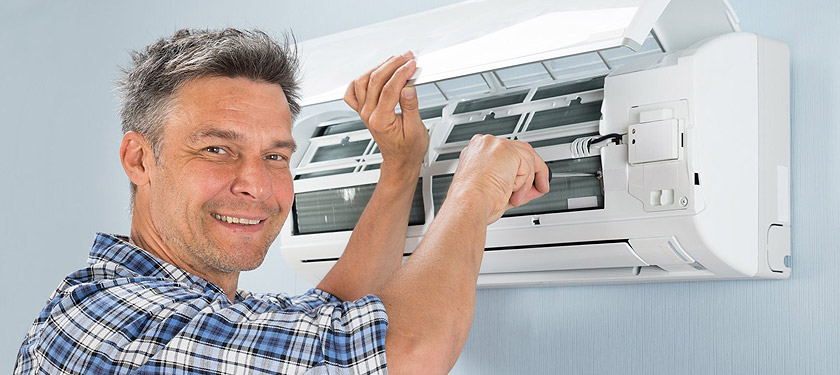
If you’re considering a new AC system or it’s simply time to replace it, you may be wondering if it’s better to get central air conditioning or a new ductless system. The answer, of course, will depend on your personal situation. But don’t worry, we’ve listed the main factors to consider below, and once you’ve read them you should be able to figure it out pretty easily.
In case you don’t know, a ductless or mini split air conditioning system is a lot like a central air conditioner system. They both consist of two units: a condenser that sits outside the home, and an evaporator/air handler that sits inside the home. Coolant passes between the two units, carrying the heat from indoors to the outdoor unit where it is released.
With a central air system, however, the cool air is sent through the air handler on your furnace into the your ductwork, where it is carried into the rest of the house. A ductless system uses slim line-set and cable between the condenser and a unit on your wall, and no ductwork is involved.
Here are some questions we ask our customers to help them decide which type is the best match for their home and needs.
This is the main decision maker for most people. If you have ductwork in your home already, it will be more cost effective to stay with a central system.
If you have no ductwork, it will cost much less to install a ductless system. There will also be much less construction mess: all you need is a 3-inch hole in the wall to run the line-set and cable through. Ductless systems are also great for homes with new additions that aren’t connected to the ductwork that runs through the rest of the house.
When you’re indoors, a central AC is invisible. A ductless system, however, requires a vent in the ceiling or slim unit on the wall. While the manufacturers go to a lot of trouble to make the boxes as stylish as possible, there is still something to see.
If you’re very particular about your décor, a central system may be a better choice for you. But these homeowners found some pretty inventive ways of disguising them.
Most ductless systems just plain don’t have enough power to cool a large home. If you home is larger (2,500 square feet and up) go with central. From 2,000 – 2,500 square feet, the greater power of a central air system will pay off, and you’ll probably get better efficiency out of a central air system.
If your home is 2,000 square feet or less, consider ductless.
As a general rule, ductless systems are quieter. If noise levels matter to you, be sure to ask your technician for the noise level (in decibels) for any systems you’re considering. Some ductless systems are louder and some central systems are pretty quiet.
Now this is a bit of a loaded question, because with central air the quality of the ductwork and the installation job play a huge role in helping a central system reach its efficiency potential.
For example, if the ductwork wasn’t designed well (more twists and turns than needed) or if it isn’t sealed properly and air is leaking, the efficiency of a central system drops. In terms of installation quality, the technician has to do things like ensure the right level of refrigerant, a level surface for the outdoor unit, the system matches the air handler, etc.
All that being said, the best ductless systems have a higher potential energy efficiency (up to 27 SEER) than the best central systems (21 SEER).
If you have some areas of your home that get way hotter than others, or different family members who like different temperatures, a zoning system is the answer.
You can get zone control in both central or ductless, but it’s cheaper with ductless. This is because to get zoning control with a central air system, you need upgraded ductwork with internal dampers.
Some ductless systems aren’t just an air conditioner, they are what’s called a ‘heat pump’. That means when it gets cold outside it can reverse direction and bring warm air in (as long as it doesn’t drop below about -7° C).
This can be helpful if you want to use your furnace less, as heat pumps are incredibly efficient.
While this general guide should help get you started, it’s always best to talk to a heating and cooling professional to make sure you’re getting all the facts as they relate to your exact home.
Whichever system you’re leaning towards, we’ll make sure you get one that’s matched to your home size and will get you the level of comfort control you are looking for.
